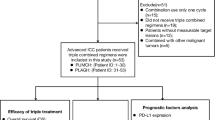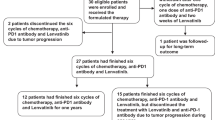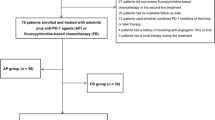Abstract
Background
In clinical practice, some patients with advanced intrahepatic cholangiocarcinoma (ICC) cannot tolerate or refuse chemotherapy due to the toxicity, necessitating alternative treatments. PD-1 blockade combined with lenvatinib showed promising results in phase II studies with small sample size, but there is a lack of data on the routine use with this regimen. This study aimed to evaluate the effectiveness and safety of the regimen in patients with advanced ICC, and to identify predictors for treatment response and prognosis.
Methods
We conducted a retrospective cohort study of patients treated with PD-1 inhibitors plus lenvatinib for advanced ICC between July 2017 and August 2022. The study endpoints were progression-free survival (PFS), overall survival (OS), objective response rate (ORR), disease control rate (DCR), and safety. Biomarker analysis for CA19-9 and PD-L1 expression was performed. Exploratory analysis for genetic alternation was conducted.
Results
The study included 103 patients. It demonstrated a median PFS of 5.9 months and a median OS of 11.4 months. ORR was 18.4% and DCR was 80.6%. The incidence of grade 3 or 4 adverse events was 50.5%. Positive PD-L1 expression (TPS ≥ 1%) was associated with higher ORR (P = 0.013) and prolonged PFS (P = 0.023). Elevated CA19-9 (> 37 U/ml) was associated with decreased ORR (P = 0.019), poorer PFS (P = 0.005) and OS (P = 0.034). Patients with IDH1 mutations exhibited a favorable response to the treatment (P = 0.011), and patients with TP53 mutations tended to have worse OS (P = 0.031).
Conclusions
PD-1 blockade plus lenvatinib is effective and safe in routine practice. PD-L1 expression and CA19-9 level appear to predict the treatment efficacy. IDH1 mutations might indicate a better treatment response.
Clinical trial registration: NCT03892577.




Similar content being viewed by others
Data availability
The data that support the findings of our study are available from the corresponding author upon request.
Abbreviations
- AE:
-
Adverse event
- BTC:
-
Biliary tract cancer
- CA19-9:
-
Carbohydrate antigen 19-9
- CI:
-
Confidence interval
- CR:
-
Complete response
- CSCO:
-
Chinese Society of Clinical Oncology
- CTCAE:
-
Common Terminology Criteria for Adverse Events
- DCR:
-
Disease control rate
- ECOG PS:
-
Eastern Cooperative Oncology Group performance status
- ICC:
-
Intrahepatic cholangiocarcinoma
- IHC:
-
Immunohistochemistry
- MMR:
-
Mismatch repair
- MSI-H/L:
-
Microsatellite instability-high/low
- NCCN:
-
National Comprehensive Cancer Network
- NGS:
-
Next-generation sequencing
- ORR:
-
Objective response rate
- OS:
-
Overall survival
- PD-1:
-
Programmed death 1
- PFS:
-
Progression-free survival
- PR:
-
Partial response
- PUMCH:
-
Peking Union Medical College Hospital
- RECIST:
-
Response evaluation criteria in solid tumors
- SD:
-
Stable disease
- TPS:
-
Tumor proportion score
References
Moris D, Palta M, Kim C, Allen PJ, Morse MA, Lidsky ME (2023) Advances in the treatment of intrahepatic cholangiocarcinoma: An overview of the current and future therapeutic landscape for clinicians. CA Cancer J Clin 73:198–222
Valle JW, Kelley RK, Nervi B, Oh DY, Zhu AX (2021) Biliary tract cancer. Lancet 397:428–444
Florio AA, Ferlay J, Znaor A, Ruggieri D, Alvarez CS, Laversanne M et al (2020) Global trends in intrahepatic and extrahepatic cholangiocarcinoma incidence from 1993 to 2012. Cancer 126:2666–2678
Valle J, Wasan H, Palmer DH, Cunningham D, Anthoney A, Maraveyas A et al (2010) Cisplatin plus gemcitabine versus gemcitabine for biliary tract cancer. N Engl J Med 362:1273–1281
Lamarca A, Palmer DH, Wasan HS, Ross PJ, Ma YT, Arora A et al (2021) Second-line FOLFOX chemotherapy versus active symptom control for advanced biliary tract cancer (ABC-06): a phase 3, open-label, randomised, controlled trial. Lancet Oncol 22:690–701
Oh D-Y, Ruth He A, Qin S, Chen L-T, Okusaka T, Vogel A et al (2022) Durvalumab plus gemcitabine and cisplatin in advanced biliary tract cancer. NEJM Evid 1:EVIDoa200015
Kelley RK, Ueno M, Yoo C, Finn RS, Furuse J, Ren Z et al (2023) Pembrolizumab in combination with gemcitabine and cisplatin compared with gemcitabine and cisplatin alone for patients with advanced biliary tract cancer (KEYNOTE-966): a randomised, double-blind, placebo-controlled, phase 3 trial. Lancet 401:1853–1865
Job S, Rapoud D, Dos Santos A, Gonzalez P, Desterke C, Pascal G et al (2020) Identification of four immune subtypes characterized by distinct composition and functions of tumor microenvironment in intrahepatic cholangiocarcinoma. Hepatology 72:965–981
Kim RD, Chung V, Alese OB, El-Rayes BF, Li D, Al-Toubah TE et al (2020) A phase 2 multi-institutional study of nivolumab for patients with advanced refractory biliary tract cancer. JAMA Oncol 6:888–894
Piha-Paul SA, Oh DY, Ueno M, Malka D, Chung HC, Nagrial A et al (2020) Efficacy and safety of pembrolizumab for the treatment of advanced biliary cancer: results from the KEYNOTE-158 and KEYNOTE-028 studies. Int J Cancer 147:2190–2198
Torrens L, Montironi C, Puigvehí M, Mesropian A, Leslie J, Haber PK et al (2021) Immunomodulatory effects of Lenvatinib plus anti-programmed cell death protein 1 in mice and rationale for patient enrichment in hepatocellular carcinoma. Hepatology 74:2652–2669
Deng H, Kan A, Lyu N, Mu L, Han Y, Liu L et al (2020) Dual vascular endothelial growth factor receptor and fibroblast growth factor receptor inhibition elicits antitumor immunity and enhances programmed cell death-1 checkpoint blockade in hepatocellular carcinoma. Liver Cancer 9:338–357
Fukumura D, Kloepper J, Amoozgar Z, Duda DG, Jain RK (2018) Enhancing cancer immunotherapy using antiangiogenics: opportunities and challenges. Nat Rev Clin Oncol 15:325–340
Villanueva L, Lwin Z, Chung HC, Gomez-Roca C, Longo F, Yanez E et al (2021) Lenvatinib plus pembrolizumab for patients with previously treated biliary tract cancers in the multicohort phase II LEAP-005 study. J Clin Oncol 39:321–321
Jian Z, Fan J, Shi G-M, Huang X-Y, Wu D, Liang F et al (2021) Lenvatinib plus toripalimab as first-line treatment for advanced intrahepatic cholangiocarcinoma: a single-arm, phase 2 trial. J Clin Oncol 39:4099–4099
Chodankar D (2021) Introduction to real-world evidence studies. Perspect Clin Res 12:171–174
Kubo S, Shinkawa H, Asaoka Y, Ioka T, Igaki H, Izumi N et al (2022) Liver cancer study group of japan clinical practice guidelines for intrahepatic cholangiocarcinoma. Liver Cancer 11:290–314
Vogel A, Bridgewater J, Edeline J, Kelley RK, Klümpen HJ, Malka D et al (2023) Biliary tract cancer: ESMO clinical practice guideline for diagnosis, treatment and follow-up. Ann Oncol 34:127–140
Dietel M, Savelov N, Salanova R, Micke P, Bigras G, Hida T et al (2019) Real-world prevalence of programmed death ligand 1 expression in locally advanced or metastatic non-small-cell lung cancer: the global, multicenter EXPRESS study. Lung Cancer 134:174–179
Chen X, Wu X, Wu H, Gu Y, Shao Y, Shao Q et al (2020) Camrelizumab plus gemcitabine and oxaliplatin (GEMOX) in patients with advanced biliary tract cancer: a single-arm, open-label, phase II trial. J Immunother Cancer 8
Ding X, Li G, Sun W, Shen Y, Teng Y, Xu Y et al (2022) Sintilimab combined with lenvatinib for advanced intrahepatic cholangiocarcinoma in second-line setting-a multi-center observational study. Front Oncol 12:907055
Maio M, Ascierto PA, Manzyuk L, Motola-Kuba D, Penel N, Cassier PA et al (2022) Pembrolizumab in microsatellite instability high or mismatch repair deficient cancers: updated analysis from the phase II KEYNOTE-158 study. Ann Oncol 33:929–938
Kautto EA, Bonneville R, Miya J, Yu L, Krook MA, Reeser JW et al (2017) Performance evaluation for rapid detection of pan-cancer microsatellite instability with MANTIS. Oncotarget 8:7452–7463
Salipante SJ, Scroggins SM, Hampel HL, Turner EH, Pritchard CC (2014) Microsatellite instability detection by next generation sequencing. Clin Chem 60:1192–1199
Cao J, Chen L, Li H, Chen H, Yao J, Mu S et al (2019) An accurate and comprehensive clinical sequencing assay for cancer targeted and immunotherapies. Oncologist 24:e1294–e1302
Zhang L, Chen Y, Wang H, Xu Z, Wang Y, Li S et al (2021) Massive PD-L1 and CD8 double positive TILs characterize an immunosuppressive microenvironment with high mutational burden in lung cancer. J Immunother Cancer 9
Xiao J, Li W, Huang Y, Huang M, Li S, Zhai X et al (2021) A next-generation sequencing-based strategy combining microsatellite instability and tumor mutation burden for comprehensive molecular diagnosis of advanced colorectal cancer. BMC Cancer 21:282
Lin J, Yang X, Long J, Zhao S, Mao J, Wang D et al (2020) Pembrolizumab combined with lenvatinib as non-first-line therapy in patients with refractory biliary tract carcinoma. Hepatobiliary Surg Nutr 9:414–424
Yang X, Chen B, Wang Y, Wang Y, Long J, Zhang N et al (2023) Real-world efficacy and prognostic factors of lenvatinib plus PD-1 inhibitors in 378 unresectable hepatocellular carcinoma patients. Hepatol Int 1–11
Yi M, Jiao D, Xu H, Liu Q, Zhao W, Han X et al (2018) Biomarkers for predicting efficacy of PD-1/PD-L1 inhibitors. Mol Cancer 17:129
Tomczak A, Springfeld C, Dill MT, Chang DH, Kazdal D, Wagner U et al (2022) Precision oncology for intrahepatic cholangiocarcinoma in clinical practice. Br J Cancer 127:1701–1708
Boerner T, Drill E, Pak LM, Nguyen B, Sigel CS, Doussot A et al (2021) Genetic determinants of outcome in intrahepatic cholangiocarcinoma. Hepatology 74:1429–1444
Wu MJ, Shi L, Dubrot J, Merritt J, Vijay V, Wei TY et al (2022) Mutant IDH inhibits IFNγ-TET2 signaling to promote immunoevasion and tumor maintenance in cholangiocarcinoma. Cancer Discov 12:812–835
Chen XX, Yin Y, Cheng JW, Huang A, Hu B, Zhang X et al (2018) BAP1 acts as a tumor suppressor in intrahepatic cholangiocarcinoma by modulating the ERK1/2 and JNK/c-Jun pathways. Cell Death Dis 9:1036
Mahipal A, Tella SH, Kommalapati A, Anaya D, Kim R (2019) FGFR2 genomic aberrations: achilles heel in the management of advanced cholangiocarcinoma. Cancer Treat Rev 78:1–7
Munugala N, Maithel SK, Shroff RT (2022) Novel biomarkers and the future of targeted therapies in cholangiocarcinoma: a narrative review. Hepatobiliary Surg Nutr 11:253–266
Acknowledgements
We thank Dr. Jianzhen Lin (the First Affiliated Hospital of Nanjing Medical University) for his sincere assistance.
Funding
This work was supported by the National High Level Hospital Clinical Research Funding (2022-PUMCH-B-128), CAMS Innovation Fund for Medical Sciences (2019-I2M-5-035, 2021-I2M-1-061, 2022-I2M-C&T-A-003), CSCO-Hengrui Cancer Research Fund (Y-HR2019-0239, Y-HR2020QN-0414), CSCO-MSD Cancer Research Fund (Y-MSDZD2021-0213), and the National Ten-thousand Talent Program.
Author information
Authors and Affiliations
Contributions
HZ and LL contributed to the conception and design of the study. All authors participated in patient follow-up and contributed to data collection. JC, SW, and HW collated the data and performed analysis. JC, SW, and HW drafted the manuscript. All authors contributed to reviewing or revising the manuscript and approved the final version.
Corresponding authors
Ethics declarations
Conflict of interest
All authors declare that they have no conflict of interest.
Ethical approval
The study was approved by the Ethics Committee of Peking Union Medical College Hospital (No. JS-1391), and was conducted in accordance with the Declaration of Helsinki. Informed consent was obtained from all patients.
Additional information
Publisher's Note
Springer Nature remains neutral with regard to jurisdictional claims in published maps and institutional affiliations.
Supplementary Information
Below is the link to the electronic supplementary material.
Rights and permissions
Springer Nature or its licensor (e.g. a society or other partner) holds exclusive rights to this article under a publishing agreement with the author(s) or other rightsholder(s); author self-archiving of the accepted manuscript version of this article is solely governed by the terms of such publishing agreement and applicable law.
About this article
Cite this article
Chao, J., Wang, S., Wang, H. et al. Real-world cohort study of PD-1 blockade plus lenvatinib for advanced intrahepatic cholangiocarcinoma: effectiveness, safety, and biomarker analysis. Cancer Immunol Immunother 72, 3717–3726 (2023). https://doi.org/10.1007/s00262-023-03523-2
Received:
Accepted:
Published:
Issue Date:
DOI: https://doi.org/10.1007/s00262-023-03523-2




